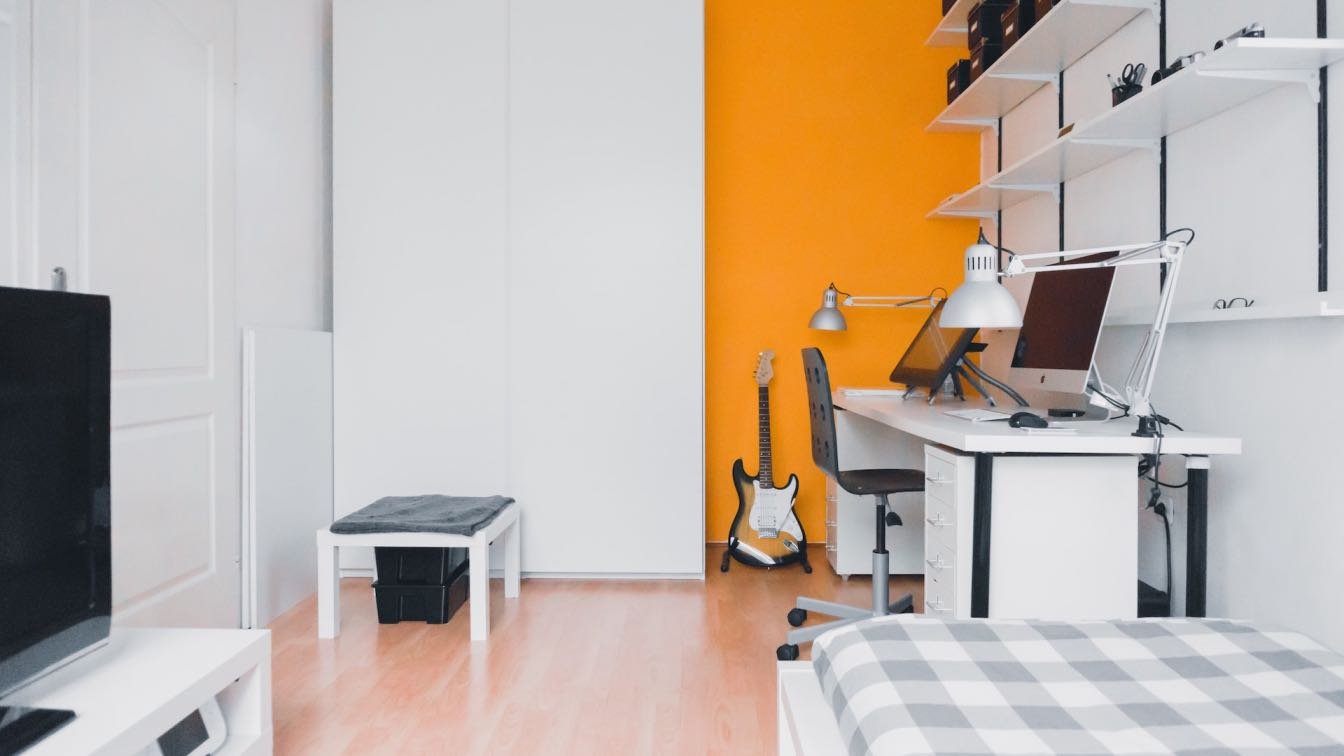Moving into a dorm room is like stepping into a new chapter of life—exciting, a little overwhelming, and full of possibilities. But let’s be real: that tiny space has to serve as your bedroom, kitchen, social hub, and, most importantly, your study zone. Creating a study environment that keeps you focused and productive can feel like a puzzle, especially when your roommate’s late-night snack runs or the lure of your cozy bed threaten to derail your plans. This guide is your roadmap to transforming your dorm room into a study haven that boosts your focus, reduces stress, and maybe even makes those all-nighters a little less painful.
Why Your Study Environment Matters
Your dorm room’s setup can make or break your academic performance. A cluttered desk or constant distractions can tank your focus, while a well-organized, calming space can help you tackle even the toughest assignments. Think of your study environment as your brain’s best friend—it sets the stage for success.
The Science Behind a Good Study Space
Studies show that your environment impacts cognitive function. A 2011 study from Princeton found that clutter can overwhelm your brain, making it harder to process information. A dedicated, tidy study area signals to your mind that it’s time to get serious.
How Your Dorm Room Can Work Against You
Dorm rooms are notorious for being small, noisy, and packed with distractions. From loud neighbors to the temptation of binge-watching your favorite show, it’s easy to lose focus. Recognizing these challenges is the first step to overcoming them.
Step 1: Declutter and Organize Your Space
Clutter is the enemy of focus. A messy desk or a pile of laundry can make your brain feel as chaotic as your room looks. Start by clearing out anything that doesn’t serve your study goals.
Start with a Clean Slate
Grab a trash bag and do a quick sweep of your dorm. Toss out old papers, organize your books, and store anything non-essential. A clean space feels like a fresh start, and it’s easier to focus when your desk isn’t buried under random stuff.
Invest in Smart Storage Solutions
Dorm rooms are tiny, so vertical storage is your friend. Think shelves, under-bed bins, or a rolling cart for supplies. Keeping your study tools organized and within reach saves time and reduces stress.
Top Storage Ideas for Dorm Rooms
- Wall shelves: Perfect for books and decor without eating up floor space.
- Desk organizers: Keep pens, notebooks, and chargers tidy.
- Under-bed storage: Slide in flat bins for extra clothes or supplies.
- Over-door hooks: Great for bags or jackets to free up your chair.
Step 2: Design a Dedicated Study Zone
Having a specific spot for studying helps your brain switch into work mode. Even in a small dorm, you can carve out a space that screams “productivity.”
Choosing the Right Desk Location
Place your desk near a window for natural light, which boosts mood and alertness. If that’s not possible, avoid facing your bed—it’s too tempting to nap. A corner setup can create a cozy, focused vibe.
Ergonomics: Comfort Meets Productivity
An uncomfortable chair or a desk that’s too high can make studying painful. Invest in a chair with good back support and adjust your setup so your laptop screen is at eye level. Your body will thank you during those long study sessions.
Pros and Cons of Common Dorm Desk Setups
| Setup | Pros | Cons |
|---|---|---|
| Desk by window | Natural light, mood boost | Potential distractions outside |
| Desk in corner | Cozy, fewer distractions | Limited space for movement |
| Desk facing wall | Minimizes visual distractions | Can feel isolating |
| Portable lap desk | Flexible, use anywhere | Less stable, not ideal for long hours |
Step 3: Optimize Lighting for Focus
Lighting can make or break your study vibe. Harsh fluorescent dorm lights can strain your eyes, while dim lighting makes you sleepy. Finding the right balance is key.
The Power of Natural Light
If you’ve got a window, use it. Natural light improves mood and keeps you alert, according to a 2013 study in the Journal of Environmental Psychology. Open those blinds during the day to let the sunshine work its magic.
Supplement with Task Lighting
A good desk lamp is a game-changer. Look for one with adjustable brightness and a warm-to-cool light range. Avoid blue-heavy lights at night—they can mess with your sleep cycle.
Best Desk Lamps for Dorm Studying
- LED Desk Lamp with USB Port: Charges your phone while lighting your workspace.
- Clip-On Lamp: Great for small desks or shared spaces.
- Adjustable Gooseneck Lamp: Direct light exactly where you need it.
Step 4: Minimize Distractions
Dorm life is full of distractions—roommates, notifications, or the siren call of social media. A focused study environment requires some strategic planning to keep these at bay.
Set Boundaries with Roommates
Talk to your roommate about study hours. Maybe agree on “quiet time” or use visual cues like headphones to signal when you’re in the zone. A little communication goes a long way.
Tame Digital Distractions
Your phone is a productivity black hole. Use apps like Forest or Freedom to block distracting sites during study sessions. Or, go old-school and put your phone in a drawer across the room.
Apps to Boost Focus
- Forest: Grow virtual trees while you stay off your phone.
- Cold Turkey: Block specific websites for set periods.
- Focus@Will: Curated music to enhance concentration.
Step 5: Personalize Your Space (Without Overdoing It)
A study space that feels like you can make studying more enjoyable. But too much personalization can turn into clutter, so strike a balance.
Add Inspiring Touches
A small plant, a motivational quote, or a photo of your dog can make your desk feel welcoming. These little touches boost your mood without overwhelming your space.
Avoid Over-Decorating
Too many posters or knickknacks can distract you. Stick to a few meaningful items and keep your desk functional. Less is more when it comes to focus.
Step 6: Create a Study Routine
Your environment is only half the battle. A solid routine ties it all together, helping you make the most of your study space.
Time Blocking for Success
Break your study time into chunks—say, 50 minutes of work followed by a 10-minute break. This Pomodoro technique keeps you fresh and prevents burnout. Use a timer to stay on track.
Morning vs. Night Studying: Which is Better?
Everyone’s different, but morning studying often feels fresher, especially with natural light. Night owls might prefer late hours when the dorm is quieter. Experiment to find your sweet spot.
Morning vs. Night Studying Comparison
| Time of Day | Benefits | Drawbacks |
|---|---|---|
| Morning | Fresh mind, natural light | Early wake-up, potential noise |
| Night | Quieter dorm, fewer interruptions | Fatigue, blue light exposure |
Step 7: Incorporate Sound (or Silence)
Sound can either help or hinder your focus. Some people thrive with background music, while others need total silence. Figure out what works for you.
The Role of Music in Studying
Instrumental music or lo-fi beats can enhance focus for some students. A 2014 study in Frontiers in Human Neuroscience found that music without lyrics boosts cognitive performance for many.
White Noise and Noise-Canceling Options
If your dorm is noisy, try a white noise machine or noise-canceling headphones. Apps like Noisli offer customizable soundscapes to drown out distractions.
Best Noise-Canceling Headphones for Students
- Sony WH-1000XM5: Top-tier noise cancellation, comfy for long wear.
- Bose QuietComfort 45: Lightweight, great for dorm life.
- Anker Soundcore Q20: Budget-friendly with solid performance.
Step 8: Keep Your Body Fueled
Studying on an empty stomach or after a junk food binge is a recipe for sluggishness. Your study environment should support your physical well-being too.
Healthy Snacks for Studying
Stock up on brain-boosting snacks like nuts, fruit, or granola bars. Avoid sugary drinks—they lead to energy crashes. Keep a water bottle on your desk to stay hydrated.
The Importance of Movement
Sitting for hours isn’t just bad for your focus—it’s bad for your health. Set a timer to stand, stretch, or walk around every hour. Even a quick lap around your dorm can recharge you.
People Also Ask (PAA)
How can I make my dorm room a better study space?
Transform your dorm by decluttering, setting up a dedicated desk area, and optimizing lighting. Use storage solutions to keep things tidy and add personal touches like a plant or photo. Minimize distractions with noise-canceling headphones or focus apps.
What are the best tools for studying in a dorm?
Invest in a good desk lamp, noise-canceling headphones, and organizational tools like shelves or desk caddies. Apps like Forest or Cold Turkey can block distractions, while a comfortable chair ensures you stay focused longer.
Where can I find affordable dorm study supplies?
Check out retailers like Target or Amazon for budget-friendly desk organizers, lamps, and storage solutions. Local thrift stores or campus swap groups can also offer great deals on used items.
Why is my dorm room so distracting?
Dorm rooms are often small, shared spaces with noise from roommates or neighbors. Clutter, poor lighting, or easy access to your phone can also pull your focus. Create boundaries and optimize your setup to minimize these issues.
FAQ Section
How do I study in a noisy dorm?
Use noise-canceling headphones or a white noise app like Noisli to block out sounds. Set clear study hours with your roommate and consider studying during quieter times, like early mornings. A consistent routine helps train your brain to focus despite noise.
What’s the best desk size for a dorm room?
A desk around 36–48 inches wide is ideal for most dorms—it’s compact but functional. Measure your space first and opt for a desk with built-in storage to maximize efficiency. Portable lap desks work if space is extremely tight.
Can plants really improve my study environment?
Yes, plants like succulents or pothos can boost mood and air quality, according to NASA’s Clean Air Study. They’re low-maintenance and add a calming vibe. Just don’t overdo it—too many can clutter your space.
How do I stay motivated to study in my dorm?
Set specific goals for each study session and reward yourself with breaks or small treats. Personalize your space with inspiring quotes or photos to keep you engaged. A consistent routine also builds momentum over time.
Should I study in my dorm or the library?
It depends on your needs. Dorms are convenient but can be noisy or distracting. Libraries offer a quiet, focused environment but may require travel. Try both and see which boosts your productivity more.
Final Thoughts
Creating the perfect study environment in your dorm room doesn’t require a big budget or a huge space—just some thoughtful planning. By decluttering, optimizing your setup, and building a routine, you can turn your dorm into a productivity powerhouse. Remember my freshman year disaster? A messy desk and constant Netflix temptations led to some rough grades. Once I carved out a dedicated study corner and set boundaries, my focus skyrocketed. You’ve got this—your dorm can be more than a place to crash; it can be where you crush your academic goals.



